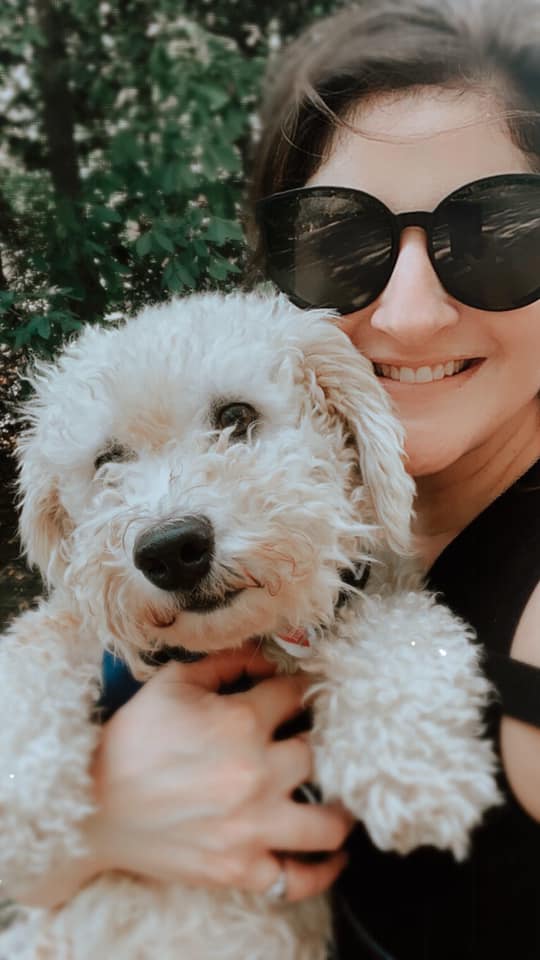by Gila Golder | photo courtesy of the Stagner family
Chewbacca Ewok (“Chewy”), a 3 1⁄2 year old poodle mix, is the newest member of the Stagner family in Memphis, joining Marcy, Troy, and sons Mason and Simon, who came up with his name. Marcy describes him as “sweet and gentle” – despite having spent most of his life in a cage with just enough room to stand up and turn around.
The Humane Society of the United States describes puppy mills as “high-volume dog breeding facilities that churn out puppies for profit, ignoring the needs of the pups and their mothers.” Typically, the dogs are kept caged 24/7 except for when they are taken out to breed. Each animal is given a number, not a name. They have no other contact with humans or other animals, no opportunities for recreation, no medical treatment, no baths. When Marcy met Chewy for the first time, he was skittish and terrified. Like most puppy mill survivors, he was dirty and smelly, avoided human touch, and didn’t want to eat.
The Stagners, excited to welcome Chewy into his new home, bought him several toys, but he hasn’t learned how to engage with them yet. “He has toys, but he doesn’t know what to do with them,” says Marcy. “He just kind of stares at them or ignores them. If I roll a ball to him, he’ll look at it, but he thinks I’m a weirdo. He’s like, what are you doing? He doesn’t know how to be a dog yet.”
Chewy has been cleaned up, neutered, and given his shots. Fortunately, he has no major health issues other than cataracts in one eye. But given the trauma he’s experienced in his short life, he has a long way to go emotionally. He has free rein in the home, but he prefers to hang out in a little corner of the laundry room. He also sleeps with a night-light and is still wary of people, except for Marcy. “I’m kind of his person,” she says. “He’ll let me cuddle him and pet him and even pick him up.”
Marcy and Chewy found each other through Havaheart Rescue, an organization based in Springfield, Missouri which is dedicated to rescuing, rehabilitating, and finding forever homes for dogs who have been neglected or abused. The not-for-profit, volunteer-run organization was willing to consider Marcy as a foster or adoptive parent even though she has not had her own dog as an adult (a requirement many rescue organizations have for prospective foster families). She interviewed and was approved as a foster parent. And then – a waiting game. Simon has environmental allergies and sensitivities, so Marcy knew they would need a hypoallergenic dog, such as a poodle. It would have been easy enough to go to the pet store and pick out a hypoallergenic breed, but she was committed to adopting an animal in need of help rather than supporting the puppy mill to pet store pipeline.

been affected by this lack of interaction, & shows this with a lack of interest in playtime.
It took a few years before Marcy saw Chewy come up on Havaheart’s Facebook feed. She reached out to the organization, and within two days, she was embarking on the five-hour drive to Springfield. When she arrived, Chewy was terrified and wouldn’t let her touch him. They stayed in a hotel in Springfield– “which was not fun, he barked all night and I thought we were going to get kicked out” –before returning to Memphis to begin the long process of getting him acclimated to life as a regular dog.
Throughout the process, Havaheart has been there to support Marcy and her family. The organization provided many of the basics a foster family needs – dog food, puppy pads, toys, treats, a leash and collar – and paid for Chewy’s first visit to the vet. Most importantly, they have assigned a few volunteers for Marcy to call or text with questions as she and her family work to rehabilitate Chewy.
Technically, they are classified as a foster family for now, but the Stagners absolutely plan to adopt Chewy once Havaheart approves him to be released for adoption. “We’re gonna be a foster fail!” laughs Marcy.
If you or your family are thinking about welcoming a pet into your lives, consider fostering or adopting from an organization like Havaheart rather than going to a pet store or even a private breeder. Breeders may not source their animals from inhumane puppy mills, but they do increase the number of animals in need of homes rather than decrease. Speaking of which, Marcy notes that if you already have a pet or pets in your home, make sure they are spayed or neutered.
And if you aren’t able to take in a pet at this point?
“Donate to rescue organizations!” Marcy advises. “They work really hard to make sure that other dogs don’t have to go through the same thing.”

